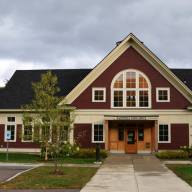The 2024 legislative session is now underway. On Monday January 22, state lawmakers hosted a public forum at Crossett Brook Middle School – fielding questions and comments from the public about education, housing, climate change and other issues.
Moderated by Willie Docto, co-owner of the Moose Meadow Lodge in Duxbury, the panel included three democratic state senators representing the Washington district – Ann Cummings, Anne Watson, and Andrew Perchlik.
House representatives included Dara Torre and Kari Dolan representing Waitsfield, Warren, Moretown, Fayston and Duxbury; Therese Wood and Tom Stevens representing Waterbury, Bolton, Huntington, and Buel’s Gore; and Ela Chapin, representing Middlesex and East Montpelier.
URGENT REPAIRS
Members of the public and local elected officials voiced frustrations about an increase of logging in Duxbury. Resident Alan Pierce said the town will be the epicenter of 12 logging jobs in the next two decades – including work on Camel’s Hump Road leading to the state park – and needs state funding to repair roads damaged by logging trucks and increasing tourist traffic.
Duxbury Select Board chair Dick Charland said that repairs are needed urgently – as the town did a scoping study to identify that work, but that he is also thinking about additional damage to the towns’ roads in the coming decades.
Dolan, who sits on the House Appropriations Committee, said she was concerned about how the state is going to support municipalities who are dealing with vulnerable gravel roads.
CLIMATE CRISIS
Duxbury Select Board member Jamison Ervin said that logging in Camel’s Hump State Park and other areas like the Worcester Range – which spans Waterbury in addition to four other Central Vermont towns, is as much about preventing road damage as it is about slowing the climate crisis and protecting endangered species. She said that current land management plans put forward by the state take none of this into account, instead focusing on the logging of mature forests.
Ervin also said that the state isn’t taking flood control seriously, with logging projects bound to put stress on waterways and exacerbate flooding. “We are in a crisis of accountability with the state,” she said, with agencies “showing complete disregard for climate solutions.”
In thinking about accountability, Perchlik said that electing a new governor might be the answer. Stevens agreed, “There’s really one answer to that – elections.”
Torre said that monitoring the Agency of Natural Resources was a top priority for the energy and environment committee she sits on in the house.
“It’s my hope that we start down that road of really financing the natural infrastructure that we need, as well as the roads that we’re all suffering with as our climate changes,” she said.
BROKEN FORMULA
Issues with the rising cost of K-12 education arose at the forum. Across Vermont, education costs have continued to rise due to a variety of factors – pandemic stimulus funds drying up, new teacher contracts, increasing health care costs and aging school infrastructure.
Property taxes are also expected to rise for many Vermonters – in part because the state’s property tax base contributes so heavily to the state’s education fund.
“What really keeps me up at night is the thought that I’d have to lay off teachers,” Harwood Unified Union School District (HUUSD) Superintendent Michael Leichliter told lawmakers.
What was specifically at issue for Leichliter and HUUSD board chair Kristen Rodgers were complicated changes to the state’s already complex education funding formula.
Beginning this year, Act 127 takes effect. It means the state will allocate more funding for students who Cummings said are “harder to educate” and “more costly” due to disability, poverty, and other factors. While they previously spent a roughly equal amount of money on every student, the new legislation essentially means that some schools will be getting more funding.
Cummings said that “some schools seem to think it’s free money,” and are using it to increase their budgets, which will fall onto taxpayers. Rodgers said that districts who did not increase their budgets beyond what was allowed, like HUUSD, will still see property tax increases. She called the state’s handling of the new formula roll-out “unethical.”
“The formula is broken,” Waterbury resident Maureen McCracken added.
Per Act 127 if a district’s equalized tax rate increased beyond 5% while the district kept per-student spending down – within a 10% increase, that district could have its tax rates capped at a 5% increase through 2029.
Cummings said that her senate committee on finance will revisit problems with the formula in a hearing on Thursday, January 25.
PARADIGM SHIFT
The panel briefly took up the housing crisis before the event’s close. Leichliter told the panel that last summer HUUSD hired two teachers who had to withdraw their offers because they could not find housing in the Harwood district.
But Wood said that while the focus of the housing crisis has been on middle-income people, the state needs to shift its focus to Vermonters living in the lowest income bracket. She said that there are 630 families who are currently unhoused, including nearly 500 children.
“We need a paradigm shift,” Chapin said – as developers are building housing as much as the system currently allows. She suggested continuing work to modify land use and development regulations under Act 250, and incentivizing multi-generational housing – structures.













